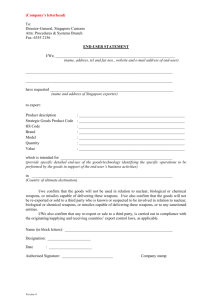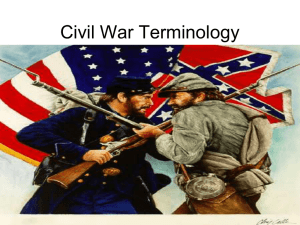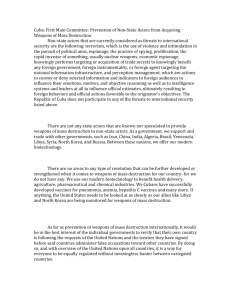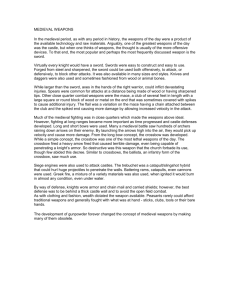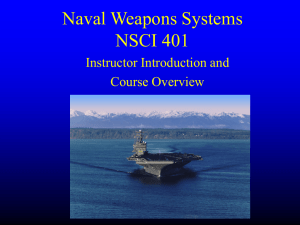strasbourg rocket
advertisement
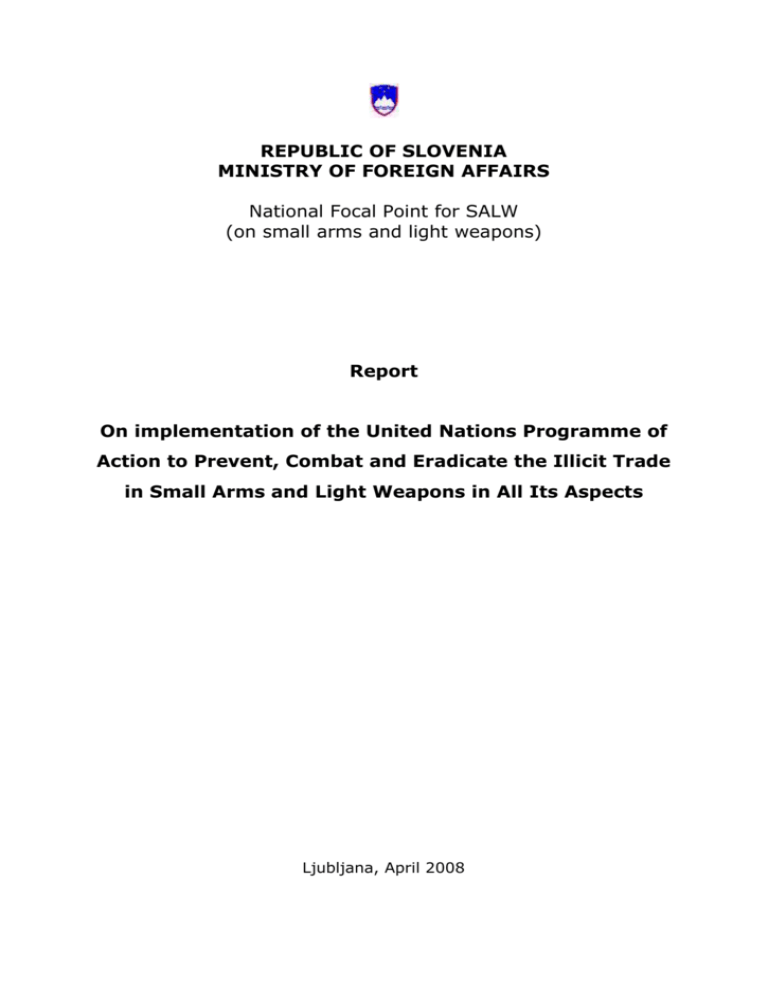
REPUBLIC OF SLOVENIA MINISTRY OF FOREIGN AFFAIRS National Focal Point for SALW (on small arms and light weapons) Report On implementation of the United Nations Programme of Action to Prevent, Combat and Eradicate the Illicit Trade in Small Arms and Light Weapons in All Its Aspects Ljubljana, April 2008 A.) National level 1. National coordination agency In Slovenia, the Ministry of Foreign Affairs remains the coordination authority for the implementation of the UN Programme of Action in Slovenia. The Ministry of Foreign Affairs is also responsible for Slovenia's foreign policy activities in the field of SALW. As an EU member, Slovenia must be engaged in certain activities of international and regional organisations. The Ministry of the Interior controls the exports and imports of SALW and the Ministry of Defence is responsible for the control over the import and export of SALW used for military purposes. The Slovenian Police and the Customs Administration are responsible for the control of the state border and border crossings. They carry out direct control over cargo crossing the state border. The Police seized large amounts of SALW, which individuals wished to carry across the territory of the Republic of Slovenia. 2. National point of contact Mrs IRINA GORŠIČ, minister counsellor, Ministry of Foreign Affairs of the Republic of Slovenia Telephone: + 386 1 478 1250 Fax: + 386 1 478 2229 E-mail: Irina.Gorsic@gov.si 3. Legislation, regulations, administrative procedures During the period covered by this report (between the first national report submitted by Slovenia to the UN Secretariat in May 2003 and June 2005), Slovenia adopted the following laws in the field of SALW: a) The Defence Act (Ur. l. RS, No. 82/1994 and 40/2004) and its amendments of 2003 and 2004, Articles 77 and 78, regulate in detail the conditions and scope for trade in military weapons and equipment, with particular emphasis on the transactions regarding the brokering in weapons, and also lay down legal sanctions for the violation of these provisions. b) The Decree of the Government of the Republic of Slovenia on Permits and Authorisations for Trade in and Manufacture of Military Weapons and Equipment (Ur. l. RS, No. 18/2003 and 31/2005) legally regulates the procedures of issuing permits for imports, exports, storing, transit or brokering in military weapons and equipment. The Decree stipulates that every application for exporting these goods be previously submitted for consideration to the expert commission for issuing preliminary opinions in the procedure of issuing permits for trade in military weapons and equipment established by the Government of the Republic of Slovenia. Prior to the issue of a permit itself by the Ministry of Defence, the commission examines every application for the export of military equipment or weapons in the administrative procedure and adopts a relevant (positive or negative) decision. c) In April 2003, the National Assembly of the Republic of Slovenia adopted the Act Ratifying the UN Protocol against the Illicit Manufacturing of and Trafficking in Firearms, their Parts and Components and Ammunition, which complements the UN Convention against Transnational Organized Crime; Ur. l. RS, No. 48/2004 of 30 April 2004; d) In April 2004, the National Assembly adopted the Act Ratifying the UN Convention against Transnational Organized Crime, i.e. the "Palermo Convention of 2000" (Ur. l. RS, No. 41/2004 of 22 April 2004). e) The Act Amending the Weapons Act was adopted in 2004 (Ur. l. RS, No. 61/2000, 73/2004). In the last amendment to the Weapons Act of July 2004, the Act again provided for a one-year transitional period for the amnesty and legalisation of weapons, and brokering in weapons was also classified in the segment of arms trade. f) The instruction on handling delivered, found or seized weapons adopted by the Ministry of the Interior in 2003 regulates the procedures for storing and handling the seized and found weapons within the Ministry of the Interior (administrative part of the Ministry and the Police). According to the instruction, all seized weapons must be stored in the Ministry of the Interior's storage facilities. In exceptional cases, the administrative units' premises may store only weapons that are "legal", i.e. weapons or a weapons document in respect of which the administrative procedure is underway at the Administrative Unit. g) Rules on the implementation of the Weapons Act (Ur. l. RS, No. 40/2005) regulates the police procedures at the state border, forms of individual records and weapons documents, border control procedures and forms harmonised with EU legislation and requirements and obligations of individuals acquiring, carrying or storing weapons and arms traders. The Weapons Act was also harmonised with the UN Protocol on Firearms ratified by Slovenia in 2003. h) In 2004, the Criminal Code (Ur. l. RS, No. 63-2167/1994 and 95-4208/2004) was amended by a definition and incrimination of brokering in transactions involving weapons, offering weapons and extending the prescribed prison sentence for the basic form of this criminal offence from three to five years of prison. Trading in small arms and light weapons (import – release for free circulation, export, transit and re-export) is limited, since the customs authorities require, together with the customs declaration, appropriate licence issued by competent authority. Legal basis: the Weapons Act in case of small arms. The licence is issued by the ministry responsible for internal affairs; The Defence Act in case of light weapons. The licence is issued by the ministry responsible for defence. For the verification of declarations which they have accepted, the customs authorities may, according to article 68 of the Council Regulation (EEC) No 2913/92 of 12 October 1992 establishing the Community Customs Code: examine the documents covering the declaration and the documents accompanying it. The customs authorities may require the declarant to present other documents for the purpose of verifying the accuracy of the particulars contained in the declaration; examine the goods and, if necessary, take samples for analysis or detailed check. When goods are subject to bans or restrictions the customs authorities may, according to article 75 of Council Regulation (EEC) No 2913/92, take any necessary measures in order to regulate the status of goods, including confiscation and sale. According to the Article 78 of Council Regulation (EEC) No 2913/92 the customs authorities may, after releasing the goods and in order to satisfy themselves as to the accuracy of the particulars contained in the declaration, inspect the commercial documents and data relating to the import or export operations in respect of the goods concerned or to subsequent commercial operations involving those goods. Such inspections may be carried out at the premises of the declarant, of any other person directly or indirectly involved in the said operations in a business capacity or of any other person in possession of the said document and data for business purposes. As it has already been mentioned, these applies to the procedures of release of goods for free circulation (the so called import), export, transit and re-export. The Council Regulation (EEC) No 2913/92 of 12 October 1992 establishing the Community Customs Code is available in all EU member states languages on the following website: http://eur-lex.europa.eu/LexUriServ/LexUriServ.do?uri=CELEX:31992R2913:SL:NOT 4. Law enforcement/criminalization i) What national legislative or other measures exist to make the illegal manufacture, possession, stockpiling and trade of SALW criminal offences under domestic law? How have these measures been implemented? (II.3) National criminal offences relating to illicit SALW Area: Date Law / other measure: Criminal Code, Article 310: Illegal Manufacture of and Trade in Weapons or Explosive Materials Manufacture 1994, last amended in 2004 (official consolidated text published in the Official Gazette (Ur. l. RS No. 95/2004) Title in original language Kazenski zakonik, Nedovoljena proizvodnja in promet orožja ali eksplozivov Title in English translation (and short form) Criminal Code, Article 310, Illegal Manufacture of and Trade in Weapons or Explosive Materials Short description, including details of penalties (1) Whoever unlawfully manufactures, acquires stores, sells, offers, barters, imports into or exports from the country firearms, chemical, biological or nuclear weapons, ammunition, or explosive materials or any other means of combat whose trade is prohibited to individuals or is restricted or having the brokering activity of mentioned goods, shall be sentenced to imprisonment for not less than six months and not more than five years. (2) If the offence under the preceding paragraph involves a large quantity of a very valuable or dangerous firearms, ammunition, explosive substances or other means of combat which represent a danger, or if the offence has been committed in a organized criminal group, the perpetrator shall be sentenced to imprisonment for not less than one year and not more than ten years. (3) Whoever unlawfully manufactures, acquires, stores, sells, barters, imports into or exports from the country component parts or spare parts of firearms, ammunition, explosive materials or any other means of military or equipment, material or component parts, which, to his knowledge, will be used for the manufacture or operation of objects from the preceding paragraphs, or have the brokering activity with mentioned goods shall be sentenced to imprisonment for not more than five years. (4) Whoever establishes an association for the purposes of perpetrating criminal offences under the first or second or third paragraph of the present article, shall be sentenced to imprisonment for not more than two years. (5) Whoever joins the above association shall be sentenced to imprisonment for not more than one year. Web link: http://www.uradni-list.si/1/objava.jsp?urlid=200495&stevilka=4208 Possession Title in original language Kazenski zakonik, člen 310 Nedovoljena proizvodnja in promet orožja ali eksplozivov Title in English translation (and short form) Criminal Code, Article 310. Illegal Manufacture of and Trade in Weapons or Explosive Materials Short description, including details of penalties (1) Whoever unlawfully manufactures, acquires stores, sells, offers, barters, imports into or exports from the country firearms, chemical, biological or nuclear weapons, ammunition, or explosive materials or any other means of combat whose trade is prohibited to individuals or is restricted or having the brokering activity of mentioned goods, shall be sentenced to imprisonment for not less than six months and not more than five years. Stockpiling Web link http://www.uradni-list.si/1/objava.jsp?urlid=200495&stevilka=4208 Title in original language Kazenski zakonik, Nedovoljena proizvodnja in promet orožja ali eksplozivov Title in English translation (and short form) Criminal Code, Article 310. Illegal Manufacture of and Trade in Weapons or Explosive Materials Short description, including details of penalties (1) Whoever unlawfully manufactures, acquires stores, sells, offers, barters, imports into or exports from the country firearms, chemical, biological or nuclear weapons, ammunition, or explosive materials or any other means of combat whose trade is prohibited to individuals or is restricted or having the brokering activity of mentioned goods, shall be sentenced to imprisonment for not less than six months and not more than five years. The perpetrator shall be sentenced to imprisonment for not less than six months and not more than five years. (6) If the offence under the preceding paragraph involves a large quantity of a very valuable or dangerous firearms, ammunition, explosive substances or other means of combat which represent a danger, or if the offence has been committed in a organized criminal group, the perpetrator shall be sentenced to imprisonment for not less than one year and not more than ten years. (7) Whoever unlawfully manufactures, acquires, stores, sells, barters, imports into or exports from the country component parts or spare parts of firearms, ammunition, explosive materials or any other means of military or equipment, material or component parts, which, to his knowledge, will be used for the manufacture or operation of objects from the preceding paragraphs, or have the brokering activity with mentioned goods shall be sentenced to imprisonment for not more than five years. (8) Whoever establishes an association for the purposes of perpetrating criminal offences under the first or second or third paragraph of the present article, shall be sentenced to imprisonment for not more than two years. (9) Whoever joins the above association shall be sentenced to imprisonment for not more than one year. Trade Web link http://www.uradni-list.si/1/objava.jsp?urlid=200495&stevilka=4208 Title in original language Kazenski zakonik, 310. člen Nedovoljena proizvodnja in promet orožja ali eksplozivov Title in English translation (and short form) Criminal Code, Article 310, Illegal Manufacture of and Trade in Weapons or Explosive Materials Short description, including details of penalties Whoever unlawfully manufactures, acquires stores, sells, offers, barters, imports into or exports from the country firearms, chemical, biological or nuclear weapons, ammunition, or explosive materials or any other means of combat whose trade is prohibited to individuals or is restricted or having the brokering activity of mentioned goods, shall be sentenced to imprisonment for not less than six months and not more than five years Web link http://www.uradni-list.si/1/objava.jsp?urlid=200495&stevilka=4208 ii) Have those groups and individuals engaged in the illegal manufacture, trade, stockpiling, transfer, possession, as well as financing for acquisition, of illicit SALW been identified, where applicable? What action has been taken under appropriate national law against such groups and individuals? (II.6) According to the provisions of the Criminal Code, groups engaged in the illegal trade and manufacture of illicit SALW are regarded as organised criminal associations, for which a stricter sentence shall be imposed than for perpetrating the basic criminal offence of illegal manufacture of and trade in weapons or explosives. Whoever joins such an organised association shall be sentenced to imprisonment of up to two years. iii) What national measures have been taken, including legal or administrative means, against activity that violates a United Nations Security Council arms embargo in accordance with the Charter of the United Nations? (II.15) The sanctions and the entire legislative corpus of international restrictive measures in the Republic of Slovenia are laid down in the Act Relating to Restrictive Measures Introduced or Implemented in Compliance with Legal Instruments and Decisions Adopted within International Organisations (Ur. l. RS, No. 127/2006) and in government decrees issued by the Slovenian Government on the basis of a specific international legal instrument against a specific foreign country or entity. (web link: http://zakonodaja.gov.si/rpsi/r04/predpis.ZAKO4744.html) National measures for the enforcement of UN Security Council arms embargoes Area: Enforcement of UN arms embargoes Legal means Date Law: Title/provision in original language Title/provision in English translation (and short form) Short description of the functions of the law/provision Web link http://zakonodaja.gov.si/rpsi/r04/predpis_ZAKO4744.html National measures for the enforcement of UN Security Council arms embargoes Area: Enforcement of UN arms embargoes Administrative means In place since Short description of the procedure(s) used to prevent/punish violations Web link A common feature of most customs services is a great quantity of consignments and travellers which can not be constantly and properly examined without delays. In order to meet the requirements of promotion of legal trade, services and travellers on one hand and to ensure effective and efficient detection and prevention of illegal activities on the other hand, the customs services have to ensure appropriate relation between the two sides. To his end, the Slovenian Customs Administration has developed a computerised control system based on risk assessment, profiling and selectivity of transactions. The system enables the customs service to canalise its resources (personnel and equipment) into checks of transactions with higher risk and to reduce the checks of transactions with lower risk. In addition, within the customs intranet (PIAC Infonet) a special system for rapid communication of alarms and warnings to the operational base was developed and consequently the authority response times have reduced substantially. However, this was only one among elements that have contributed to the higher level of society protection or to increased efficiency of the customs service in its fight against illegal trade of SALW. Also very important was the establishment of mobile anti-smuggling units extra trained and equipped (endoscope, contraband detector, laser distance meters, various testers, etc.) for examination and search of transport vehicles. The units are exclusively intended for fight against smuggling of various types of goods (SALW, prohibited drugs, cigarettes, alcohol beverages, etc.). They are allocated to border posts where the probability of smuggling attempts is the greatest. Furthermore, co-operation and exchange of information among national and international institutions are of great importance. The customs service co-operates and exchanges information primarily with the police, the ministry of defence and with foreign customs administrations on the ground of agreements on mutual administrative co-operation in customs matters. Risk management, proper equipment and trained customs officers together with cooperation and exchange of information are the basis of the customs system for fight against illegal trade in SALW. 5. Stockpile management and security i) What national standards and procedures exist for the management and security of SALW stocks held by armed forces, police or other authorized bodies? (II.17) National standards and procedures for stockpile management and security Group: Armed forces Police Standards / procedures Date Security procedures and stockpile management of weapons held by the Police are governed by internal rules and acts of the Ministry of the Interior and the Police. Security procedures and stockpile management of seized weapons are governed by the Decree on the procedure of handling of seized objects and assets. The Decree was first published on 14 March 2002 in the Official Gazette Ur. l. RS No. 22/02 and amended in Ur. l. RS No. 8/07) Name and briefly describe Web link Name and briefly describe - Decree on the procedure of handling of seized objects and assets, 2002 2002 - Instruction on handling delivered, found or seized Other authorized bodies weapons, 1 December 2003 Web link www.vlada.si/mma_bin.php?id=2007020419303438 Name and briefly describe 2003 Web link ii) How often are stocks of SALW held by armed forces, police and other authorized bodies reviewed? (II.18) The Commission for the Classification of Weapons of the Ministry of the Interior and the Logistics Office of the Police keep record of seized weapons and ammunition. The weapons are usually destroyed at least twice a year and the quantity of classified weapons is updated accordingly. The records of service weapons held by the Police are regulated by the Police Act and Police station rules. Commanders of police stations and heads of internal organisation units in the Police are responsible for supervision. The number of weapons in stock is reviewed at least once a year at the yearly inventory. iii) How are those stocks of SALW held by armed forces, police and other authorized bodies that are surplus to requirements identified? (II.18) Weapons held by the Police have no special imprinted markings; they are fitted with a bar code and registered in the central database of all weapon holders in the Republic of Slovenia by type and serial number. Wearing, using, keeping and maintaining of weapons by authorised official persons in the customs service are regulated by the Rules on Wearing and Use of Weapons in the Customs Service (OJ RS 111/00). Chapter 5 of the Rules lays down the ways of handling and protection of weapons when not in use and protection of weapons kept by authorised official persons at home. Article 9 provides for the director-general to appoint persons in charge for taking over and providing weapons, their storage and maintenance when not in use and for keeping special registers. Articles 12 and 13 provide that weapons shall be stored in suitable premises secured against unauthorised access, theft, fire and other dangers or misuse. Director-general of the Customs Administration appoints a commission in charge for annual control of storage and maintenance of weapons. The commission checks whether persons responsible for stock management act in compliance with the provisions of the Rules. Assessment of surpluses is made by the commission in co-operation with an external organisation every two years. The Rules on Wearing and Use of Weapons in the Customs Service are available on the web page http://www.ius-software.si/Baze/REGI/F/H00205CR.htm 6. Collection and disposal i) Please give details of any national programmes that have been established and implemented for the responsible disposal of surplus stocks of SALW held by armed forces, police and other authorized bodies. (II.18) As already mentioned, handling of seized weapons within the Police is regulated by the 2003 Instruction on handling seized weapons and explosives. The Instruction regulates in greater detail the method of stockpiling and handling seized weapons with the diligence of a good manager and implements the Government Decree on the procedure of handling of seized objects and assets. Weapons for civilian use are stored by the Ministry of the Interior, while military weapons are stored by the Ministry of Defence pending a final decision of the Judiciary. Upon its final decision, prohibited weapons are destroyed, whereas permitted weapons are destroyed, sold or donated to a museum. Handling of service weapons is governed by the Police Act and Police station rules. Both legal instruments provide for the method of stockpiling (obligatory use of physical and technical security measures for storage facilities), records of entry into the storage facilities, assignment of weapons, taking weapons out of storage and their return, and the method of supervision of weapons. ii) Is destruction the means used to dispose of such stocks? (II.18) iii) What national measures exist to safeguard such stocks prior to their disposal? (II.18) Physical and technical security measures for storage facilities, records of entry into and exit from storage facilities, list of persons authorised to access the storage. iv) Subject to the exceptions set out in paragraph II.16 of the UN Programme of Action, are all confiscated, seized or collected SALW destroyed? (II.16) No. Only prohibited, unusable, dangerous and altered weapons must be destroyed. The rest of the weapons, for which documents can be obtained, are sold or donated to a museum. In practice, 95 per cent of all seized weapons are destroyed. v) What methods has your country used to destroy surplus stocks of SALW designated for destruction? (If appropriate, please make reference to the report of the UN SecretaryGeneral (S/2000/1092) of 15 November 2000.) (II.19) Destruction by melting in a foundry. A total of 27.499 (22.193) items of different weapons were seized in procedures relating to criminal offences or violations. Table 1 Overview of the seized weapons according to type and security event Weapon 2006 2007 Gas Com 58 61 Side Com 362 539 Hunting Com 121 98 Air weapon Com 6.026 30 179 137 Com Pistol Gun Com 81 51 Bombs Com 10 18 Eksplosives Grams 25.823 10.036 Igniter Com 7 31 Source: Uniformed Police Directorate of the General Police Directorate, Ministry of the Interior, 2008 7. Export controls and brokering In the Republic of Slovenia small arms and light weapons (SALW) are by regulations not treated as a separate category, but are as (non-military) civilian weapons included in regulations covering this area. SALW military weapons are included in the Defence Act, and as indicated in Article 77, only a company, institute or other organisation, which has been granted a licence for trade in military weapons and equipment by the Ministry of Defence, may be involved in brokering military weapons and equipment. Brokering is explained in detail in the Decree on permits and consents for the trade in and production of military weapons and equipment, which lays down the conditions for acquiring a permit as well as cases in which a permit may be revoked. In the fight against SALW brokering we have improved particularly the cooperation between state bodies (Ministry of Defence, Ministry of the Interior, customs, Slovene Intelligence and Security Agency – SISA) in terms of exchange of information. Another important aspect is the cooperation at the international level in terms of exchange of information with international organisations, of which the Republic of Slovenia is a member. 8. Disarmament, demobilization and reintegration (DDR) In 2004 The Foundation "TOGETHER" took over as the coordinator of the Network “TOGETHER”- an international partnership for psychosocial well-being of children, families and communities. The Foundation "TOGETHER" is also a partner of numerous international associations and cooperates with many universities abroad. The Network “TOGETHER” was established on the basis of the Medical network for social reconstruction in former Yugoslavia (Medicisnka mreža). It began its informal activity in the year 1991 when a smaller group of experts met at the IPPNW conference. The network was active even in times of the worst violence in Yugoslavia and it united experts from the regions that were at that time at war. The network was officially founded in 1997 at a conference in Graz-Austria. The conference brings together medical and other experts from all parts of the former Yugoslavia and the world and offers possibilities for professional exchange of experiences and knowledge and also offers different forms of support and assistance. The most important programmes and activities are: • Psychosocial programmes for teachers aimed at strengthening their capacities to help children with special needs traumatized children, and otherwise emotionally affected children and to improve the overall psychosocial climate in schools • Training for medical workers, helping them to provide psychological assistance to children and parents in the framework of primary health care services • Development of voluntary work, as a way of community based psychosocial help to children and adolescents in need • Development of voluntary work of children and youth as a way of their involvement in the social processes and strengthening and developing social responsibility and prevention of psychosocial disorders • Development and support of child mental health institutions • Organization of conferences and seminars for exchange of experiences and models of good practise between states and development of common projects • Publishing academic literature about psychosocial themes • Support of the local and regional partner organizations in their seeking of funds, development of their administrative capacity and psychosocial capability In the programmes, organized by the Foundation "TOGETHER" and implemented together with its partner organizations in individual countries, hundreds of professionals (psychiatrists, paediatricians, other medical workers, psychologists, pedagogues, special teachers, speech therapists, social workers), thousands of participants of educational programmes (teachers and other school workers, health workers, volunteers) and hundreds of thousands of children and their parents are included. B.) Global level 1. International instruments against terrorism and crime I. UNITED NATIONS 1. Convention on the Prevention and Punishment of Crimes against Internationally Protected Persons, including Diplomatic Agents; New York, 14. 12. 1973 2. International Convention against the Taking of Hostages; New York, 17. 12. 1979 3. International Convention for the Suppression of Terrorist Bombings; New York, 15. 12. 1997 4. International Convention for the Suppression of the Financing of Terrorism; New York, 9. 12. 1999 5. International Convention for the Suppression of Acts of Nuclear Terrorism; New York, 13. 4. 2005 (in the ratification process) II. INTERNATIONAL CIVIL AVIATION ORGANIZATION 6. Convention on Offences and Certain Other Acts Committed on Board Aircraft; Tokyo, 14. 9. 1963 7. Convention for the Suppression of Unlawful Seizure of Aircraft; Haag, 16. 12. 1970 8. Convention for the Suppression of Unlawful Acts against the Safety of Civil Aviation; Montreal, 23. 9. 1971 9. Protocol on the Suppression of Unlawful Acts of Violence at Airport Serving International Civil Aviation supplementary to the Convention for the Suppression of Unlawful Acts against the Safety of Civil Aviation; Montreal, 24. 2. 1988 10. Convention on the Marking of Plastic Explosives for the Purpose of Detection; Montreal, 1. 3. 1991 III. INTERNATIONAL ATOMIC ENERGY AGENCY 11. Convention on the Physical Protection of Nuclear Material; Vienna, 3. 3. 1980 12. Amendments to the Convention on the Physical Protection of Nuclear Material; Vienna, 8. 7. 2005 (in the ratification process) IV. INTERNATIONAL MARITIME ORGANIZATION 13. Convention for the Suppression of Unlawful Acts against the Safety of Maritime Navigation; Rome, 10. 3. 1988 14. Protocol of 2005 to the Convention for the Suppression of Unlawful Acts Against the Safety of Maritime Navigation; London, 14. 10. 2005 15. Protocol for the Suppression of Unlawful Acts against the Safety of Fixed Platforms Located on the Continental Shelf; Rome, 10. 3. 1988 16. Protocol of 2005 to the Protocol for the Suppression of Unlawful Acts Against the Safety of Fixed Platforms Located on the Continental Shelf; London, 14. 10. 2005 V. COUNCIL OF EUROPE 17. European Convention on the Suppression of Terrorism; Strasbourg, 27. 1. 1977 18. European Convention on the Transfer of Proceedings in Criminal Matters; Strasbourg, 15. 5. 1972 19. European Convention on the Compensation of Victims of Violent Crimes; Strasbourg, 24. 11.1983 (Ministry of Justice is preparing initiative for the ratification) 20. Convention on Cyber-Crime; Budapest, 23. 11. 2001 21. Additional Protocol to the Convention on Cyber-Crime, concerning the criminalisation of acts of a racist and xenophobic nature committed through computer systems; Strasbourg, 28. 1. 2003 22. Protocol amending the European Convention on the Suppression of Terrorism; Strasbourg, 15. 5. 2003 23. Council of Europe Convention on the Prevention of Terrorism; Warsaw, 16. 5. 2005 24. Council of Europe Convention on Laundering, Search, Seizure and Confiscation of the Proceeds from Crime and on the Financing of Terrorism; Warsaw, 16. 5. 2005 (in the process of signing) 2. International cooperation and assistance i) Please give details of your country's cooperation with Interpol for the purpose of identifying those groups and individuals engaged in the illicit trade in SALW in all its aspects. (II.37) Through the Interpol system, information between Member States is exchanged on: - major quantities of seized weapons in Slovenia or thefts of weapons in Slovenia; - verifications of origin of weapons seized or found in the Republic of Slovenia; acquisitions of legal weapons in third countries by Slovenian residents or legal entities (on the basis of provisions of the European Convention on the Control of Acquisition and Possession of Firearms by Individuals). ii) Please give details of your country's use and support of Interpol’s International Weapons and Explosives Tracking System database (including providing relevant information on the illicit trade in SALW). (III.9) All major cases of seized weapons or thefts of weapons in Slovenia are reported to Interpol SG in Lyon. Unfortunately, we have no practical experience with the operation of the system and its applicability. iii) Please describe any steps your country has taken in cooperation with other states, or regional or international organizations, to develop common understandings of the basic issues and the scope of the problems related to illicit brokering in SALW. (II.39) With other EU Member States we have exchanged data on natural and legal persons licensed for brokering transactions involving weapons. In compliance with Slovenia's obligations to the EU, since 2004 Slovenia publishes the annual report on the import and export of military weapons, accessible on the web pages of the Ministry of Defence of the Republic of Slovenia. (web page: http://www.mors.si/fileadmin/mors/pdf/dokumenti/izvoz_uvoz_orozja2006_eng.pdf). On 8 February 2005, Slovenia became a member of the Wassenaar Arrangement uniting countries with strictly regulated exports of conventional weapons. The Wassenaar Arrangement focuses on the issue of SALW, particularly the improved control of the export of portable rocket launchers (MANPADS), which is an important element of exports control in Slovenia. 3. Information exchange i) Please give details of any information on, inter alia, SALW confiscated or destroyed within national jurisdiction, or other relevant information such as illicit trade routes and techniques of acquisition, that your country has submitted to relevant regional and international organizations. (II.23) Illicit weapons in Slovenia usually originate from the Balkan countries or former members of the Warsaw Pact. The weapons are smuggled along established smuggling routes of the so-called Balkan route leading from Turkey via Western Balkan countries to the EU in lorries, ships and cars. Most weapons are smuggled in lorries or regular busses which run daily between the Western Balkans and the EU. Most of the time they are shipped as unaccompanied packages left in the bus by smugglers and collected by other persons, i.e. recipients, at the final destination. Trade in illicit weapons in Slovenia is led by specialised criminal associations dealing mainly with illicit trade and smuggling of weapons, primarily from Croatia to Slovenia. Such trade often involves persons that already deal with weapons as a hobby or professionally (sport shooters, collectors, traders, as well as members of criminal associations involved in trafficking in stolen objects and illicit drugs). 4. Training, capacity-building, research i) Please describe any initiatives your country has undertaken to enhance cooperation and exchange of experience and training among competent officials, including customs, police, intelligence and arms control officials, at the national, regional and global levels in order to combat the illicit trade in SALW in all its aspects. (III.7) Training of police officers in Slovenia is conducted at the Police Academy and later as multiplier training at regional Police directorates at least once a year. Training at Police directorates is conducted according to a set programme by the Criminal Investigation Police and bomb experts from the Police Special Unit. ii) Please give details of any action-oriented research aimed at facilitating greater awareness and better understanding of the nature and scope of the problems associated with the illicit trade in SALW in all its aspects that your country has developed or supported. (III.18) In 2005 and 2007 the Criminal Investigation Police compiled a report on the status of illicit trade in weapons in the Republic of Slovenia. The systematic report includes all data on criminal offences involving illegal or legal weapons in Slovenia in the reported periods and on concluded criminal cases in Slovenian courts. It also incorporates data and an evaluation of the situation regarding incidents involving weapons (suicides, wounds) and the use of legal weapons in criminal offences.
